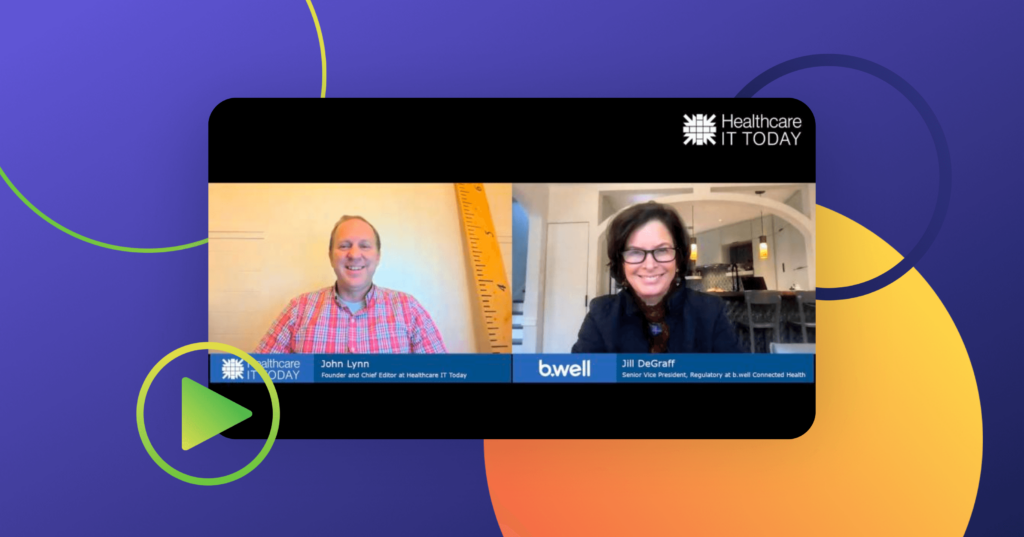Healthcare interoperability is fueling substantial advancements, enhancing both consumer care and operational efficiency. As explored in a recent interview with Kristen Valdes, CEO & Founder at b.well, and InteropNow! podcast host Sandy Vance, healthcare interoperability lies at the heart of seamless communication, collaboration among healthcare providers, and efficient data exchange. These elements are pivotal in improving patient outcomes and revolutionizing healthcare delivery. This blog dives into the transformative power of interoperability, focusing on the impact of the Trusted Exchange Framework and Common Agreement (TEFCA) in empowering consumers and fostering innovation in healthcare technology.
Unpacking Healthcare Interoperability: A Catalyst for Change
Interoperability isn’t just a trendy term in healthcare; it represents a fundamental shift in how healthcare information is accessed, shared, and utilized. The concept of interoperability is at the forefront of discussions surrounding digital tools and personalization in healthcare, as the increasing availability of apps, data sets, and systems does not necessarily equate to a better patient experience. In fact, the proliferation of disconnected experiences has led to confusion and overwhelm for consumers, highlighting the need for a cohesive ecosystem.
Today, for most healthcare consumers, their electronic health records (EHRs), medical devices, CRMs, virtual care apps, and other healthcare IT systems do not communicate with each other, and when they do, they often speak incompatible languages. This disconnect exacerbates the consumer’s frustration.
By breaking down silos and enabling the free flow of data across disparate systems, interoperability holds the key to unlocking transformative potential in patient care. Interoperability addresses this issue by enabling the smooth exchange of patient health information across diverse systems and organizations. It serves as the fundamental framework to bridge these gaps and connect the various elements within healthcare.
Digital tools play a crucial role in driving healthcare interoperability forward, offering innovative solutions to longstanding challenges in healthcare. From electronic health records (EHRs) to telehealth platforms, technology has the power to revolutionize patient outcomes and operational efficiency. By harnessing the power of generative AI and longitudinal data sets, healthcare providers can gain valuable insights, personalize care plans, and ultimately improve health outcomes for patients.
Identity Management’s Role in Safeguarding Patient Privacy
Robust identity management is not just a technical requirement; it’s a cornerstone of trust in healthcare. In today’s digital age, where sensitive patient data is exchanged across various platforms, ensuring the integrity and security of identities is paramount. Advanced certification processes like IAL-2 level certification bring cutting-edge technologies to the forefront, incorporating features like liveness detection and documentation verification. These technologies add layers of security, ensuring that only authorized individuals have access to patient information.
By prioritizing patient privacy and data security, healthcare organizations can foster a culture of trust among consumers and providers. Patients need assurance that their personal health information is safeguarded at all times, and robust identity management measures provide precisely that. When patients trust that their data is protected, they are more likely to engage actively in their healthcare journey, leading to better outcomes and enhanced patient satisfaction.
Empowering Consumers by Streamlining Data Access
Given the ongoing trend toward heightened consumer empowerment, easy access to healthcare data is no longer a mere luxury; it’s a necessity. Organizations like b.well and Samsung Health are at the forefront of innovation, forging partnerships to create user-friendly platforms that empower consumers to access and understand their health information effortlessly.
By streamlining data access, these partnerships are democratizing healthcare information, putting the power back into the hands of consumers. Gone are the days of fragmented medical records and cumbersome processes. Now, consumers can access a comprehensive view of their health information with just a few clicks, enabling them to make more informed decisions about their care.
But empowerment goes beyond mere access; it’s about understanding and utilizing health information to its fullest potential. User-friendly interfaces and educational resources ensure that consumers not only access their data but also comprehend it. Armed with this knowledge, consumers can actively participate in their healthcare journey, collaborating with providers to achieve better health outcomes.
The Role of Regulation and Collaboration
Government regulations serve as a guiding force in shaping the future of healthcare interoperability. Regulations like the CMS prior authorization rule aim to streamline administrative processes and enhance data sharing capabilities, laying the groundwork for greater collaboration among healthcare stakeholders.
Collaboration is the cornerstone of successful healthcare interoperability initiatives. From providers to payers to technology companies, each stakeholder plays a vital role in driving interoperability forward. By working together, these entities can break down silos, share data seamlessly, and ultimately improve the overall healthcare experience for consumers.
Moreover, collaboration extends beyond individual stakeholders to encompass the entire healthcare ecosystem. Interoperability requires alignment across various sectors, from healthcare delivery to technology innovation. Only through collective efforts can we realize the full potential of interoperability and usher in a new era of healthcare excellence.
Embracing the Future of Healthcare Interoperability with the Right Tech
Interoperability stands at the forefront of a healthcare revolution, driven by technological innovation, regulatory reform, and a shared commitment to consumer empowerment. With TEFCA leading the way as a national framework for data exchange, we stand on the cusp of a new era in healthcare—one defined by seamless communication, empowered consumers, and improved patient outcomes.
At b.well, we’re proud to be at the forefront of this transformation, leveraging technology to empower individuals and enhance the overall healthcare experience. Join us in embracing the future of healthcare, where healthcare interoperability is not just a goal but a reality that is transforming lives every day.



